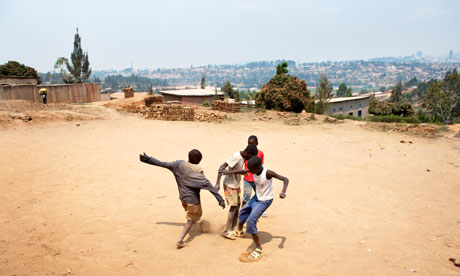
When my elder sister got pregnant at 18 and was married off before she could finish her schooling, it affected me and left me with a lot of questions as to whether that was the life she had dreamt of. I knew at that time that neither she nor I had a chance to get any information on sexuality. When I started university, I set a goal to become informed about sexuality so that I didn't become a victim.
I started volunteering for an organisation that focused on sexual and reproductive health and rights, and trained as a peer educator. For five years I was a peer educator for young people in and out of school. When I graduated, the organisation employed me as a project co-ordinator.
I am now a co-ordinator of the safe abortion action fund, a project run by the Rwandese Association for Family Welfare. I run different activities that advocate for safe abortion services in Rwanda through working with civil society organisations concerned with women's health and welfare. I love my job.
In our society, young people's sexuality is taboo and not openly discussed. But the government is now making efforts to address young people's needs by setting up youth friendly centres and increasing access to condoms.
In my country, using contraception is interpreted as being sexually active, I once interviewed girls who told me they wouldn't go for contraceptives at the nearby health centre because they are afraid they may meet a relative or friends of their parents there. They don't want to be recognised as being sexually active before they are married.
Young girls are more vulnerable to the issues of sexuality. The saddest moment I have faced in my work was interviewing girls who are in prison having had an abortion, looking in their eyes, knowing they are victims of ignorance, knowing that it is not their fault but it is society that has failed them by not providing the information and services that they are entitled to.
Being a peer educator is empowering; you gain knowledge and pass on knowledge. Most young people would prefer to ask questions about sexuality to a person of their own age who has been trained and has correct information. Peer education lets young people express their views in a comfortable way.
My friends think am a brave person to have taken a step to break the boundaries around young people's sexuality. They agree that young people's sexual and reproductive health and rights need to be addressed and have been neglected due to society's taboos.
In my current work, I am not only promoting young people's sexual and reproductive health and rights, but addressing one of the most sensitive topics of sexuality - abortion. I often get criticisms even from my friends, who think I am unreligious for doing what I do. I always find myself explaining to people around me the importance of legal and safe abortion services, it always surprises me to learn how many people, even the educated ones, are not aware of the situation of unsafe abortion in my country and its consequences.
Policymakers and service providers need to understand and accept that young people are sexual beings who can be sexually active. If the necessary and correct information is not given to them, it increases their vulnerability to be exposed to dangerous, incorrect information which may lead them to suffer consequences like unwanted pregnancies, HIV infection or unsafe abortions.
Policymakers should make laws and policies that enable young people to access sexual and reproductive health services. Comprehensive sexuality education should be part of the school curriculum, there is need to establish youth friendly services that respond to young people's specific needs, including contraceptives, especially emergency contraceptives.
The government must undo the taboos. The stigma around young people's sexuality does more harm than good, young people need to be listened to and helped, not judged and discriminated because of their sexuality.

